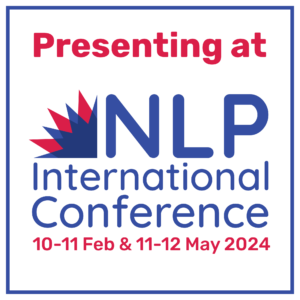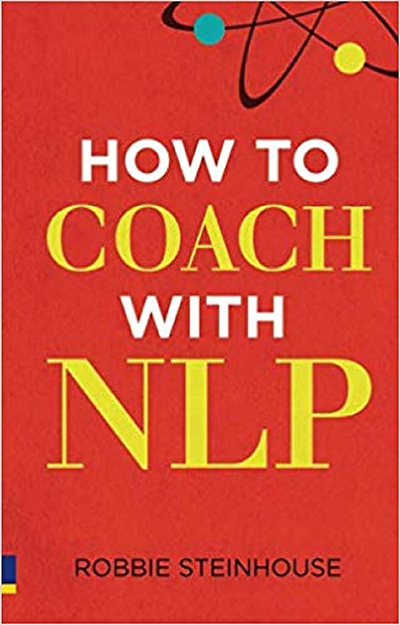What is NLP?
NLP is a set of tools for personal change and development. It offers a model about how the brain works (neuro); how language interacts with the brain (linguistic) and how we use these components to systematically get the results we want for ourselves and others (programming).
Is NLP for professional or personal development?
It’s for both. Often people attend NLP training intending it to be “just for work” or “just for my personal life,” and are pleasantly surprised to see both these areas benefit, or the major change occurring where they didn’t expect.
Relationships, whether they are at work, at home, or in other spheres of life, are all positively impacted by NLP.
NLP will help you to explore goals, decisions, and motivations that can transform your health, habits, and sense of self.
You’ll learn how to avoid getting your buttons “pushed” without your consent and explore and adjust your habitual reactions, and your effect on others.
Most people say NLP makes their life and relationships warmer & happier, both at home, and at work.
For more information on NLP in the workplace, check out the next couple of frequently asked questions.
How can I tell my employer about NLP training and ask them to support me?
We have a fact sheet called Gaining Employer Support. Please get in touch to request it.
NLP techniques are widely used in many organisations. Our clients include major banks, charities, media organisations, government departments and professional services. They recognise the return of investment NLP training gives in terms of leadership and management, systems thinking, presence and presentation, sales, coaching skills and much more.
Employers like NLP as it provides practical tools to make people more effective at work, increase employee engagement, improve staff retention, increase morale and encourage greater productivity.
The integrated approach provided by NLP training has also been picked up by some of the more cutting edge business schools as they strive to help leaders deliver excellence and avoid buckling under the pressure. NLP models impact leadership and management, project planning, and team building.
NLP performance tools help prepare staff for presenting, conference speeches, media interviews, reviews and other significant or challenging events.
People use NLP listening skills and coaching models to manage people and deal with conflicts. Human resources professionals are often NLP practitioners, along with those working within learning and development.
What type of people attend NLP School?
All types. From the private sector, public sector, self-employed, full-time parents or carers…
You can apply the NLP tools you learn to whatever set of activities you choose, both at work and at home. Here are a few examples from our past students; a mother, a VP of Sales, a Creative Director and an HR Director and Coach.
I work for a charity, is there any discount?
Yes. We’re pleased to offer a 20% discount for registered charities. Please get in touch early to secure your place.
I want to take an NLP course I but can’t make a particular module or day. Is there a way around it?
Please get in touch. You can always repeat the missing module later, and we can probably work around a day or so’s absence and help you to catch up.
But what if I don’t want to ‘practice’ NLP professionally? Is the NLP Practitioner course still for me?
Yes. The course happens to be called that, but the word ‘practitioner’ in this context doesn’t necessarily mean you’re intending to practice NLP professionally.
In fact, perhaps most people who undertake NLP Practitioner training are doing it for themselves. The NLP skills learned, do, however, enhance their current job and future prospects, and the certification means you take away proof of the competence you have gained; a useful addition to your CV.
NLP Practitioner modules are also the first step for people wanting to continue with NLP at a higher level. They are the starting point for coaches and trainers who might eventually want to teach or practice NLP professionally.
What’s NLP School’s accreditation?
NLP School is aligned, recognised and accredited by NLP University in Santa Cruz, California, which as one independent consultant put it, supplies ‘the gold standard in NLP training.’ In existence for more than 20 years, Robert Dilts and Judith Delozier’s NLP University and its International Trainers Network is regarded as the most respected and rigorous NLP trainers’ institute in the world, and the certification is accepted accordingly.
We are also accredited by ANLP, the leading UK NLP body. ANLP offers NLP School delegates a membership discount should you wish to join ANLP as a member after the course has finished.
We’re very pleased that the International Coaching Federation has certified us as an accredited provider for our NLP Practitioner course. The ICF is the Worlds largest coaching membership and accreditation body – this gives another quality mark of assurance to our training.
The Life Coach Directory recommends our NLP courses and you will be eligible to join as a professional member once you have completed NLP School’s Practitioner course
Some NLP trainers certify people in one week: why is your NLP Practitioner course longer?
We hold the reputation of NLP very highly. We know people can learn through reading and videos, but for skill development – and NLP is fundamentally a set of skills – nothing can replace the extensive and thorough direct experience that a proper NLP Practitioner course provides.
There are those in the field who believe that NLP can be taught rapidly by relying on hypnotic implantation techniques. The belief goes that students’ unconscious minds receive the complete training and they do not need to spend much time practicing, as they have already embedded the information at the unconscious level. These speed courses usually cost far more on a daily basis than the longer courses.
Remember learning to ride a bike? Would just reading a manual and watching someone else ride a bike have taught you to cycle? No, you need to get on the bike yourself. How about swimming? Driving a car?
Shorter courses may seem attractive, but in the long run they’re poor value for money, and do not give you exposure to a meaningful level of training. It’s also worth noting that the Professional Guild of NLP chooses not to accredit this type of Practitioner training.
Take a look at the video to see
- how one of our course attendees shopped around for his NLP Practitioner programme,
- how he rated the various accreditations he came across,
- why he had concerns about very short programmes.
What qualification will I receive?
After attending Module 1, How to Coach with NLP, you will receive an attendance certificate and a letter summarising the course content and contact time with the trainer. If you choose to go on to complete all three modules, you will have reached NLP Practitioner level and will receive NLP Practitioner Certification.
Every module of our course is CPD accredited so, if you need it, you will also receive a CPD certificate.
One of the uses for an NLP certificate is to be able to go on and study more advanced courses where the presentation of the certificate is a requisite of entry.
The qualification is a great asset on your CV, and employers are increasingly recognising the positive benefit that NLP-trained staff can bring to their organisations.
Do I need to do any preparation before attending an NLP course?
You’ll receive your log in to our e-learning portal, with NLP Resources and Videos as soon as you register for the course, follow the instructions therein and you will arrive well prepared. If you want to do some further reading or study, get in touch and we’ll make some suggestions.
Where’s the training held and what’s the day-to-day timing?
Our online courses are held live on Zoom. We also give our attendees access to our e-learning portal where lectures and NLP and Coaching resources are recorded on video for you to watch prior to your course starting. Doing this has enabled us to “flip the classroom” and keep our live sessions fresh, varied and engaging with plenty of interaction. We believe that this format deepens the connection between students and teacher and adds more value to the course. Practitioner delegates have one years access to the portal plus the recordings of the live sessions are also added there after each module, giving you the opportunity to watch the course again should you wish to.
Our face to face courses are held at Regent’s College Conference Centre, in the middle of leafy Regent’s Park in London. The venue is a ten-minute walk from Baker Street Underground Station. The nearest railway stations are Euston, King’s Cross and Paddington. (Paddington is linked to Heathrow Airport by the 15 minute Heathrow Express train).
The programme kicks off at 9.30am each day, and finishes between 5.30pm- 6.00pm – we aim for 5pm but the nature of NLP means we can’t always have an exact finish. If you’ve got a train to catch or need to pick up your child, don’t worry, just let us know you need to slip out.
Your question isn’t here? Please contact us and we’ll be happy to answer it.
We’re at info@nlpschool.com and telephone number +44 (0) 207 274 9213










